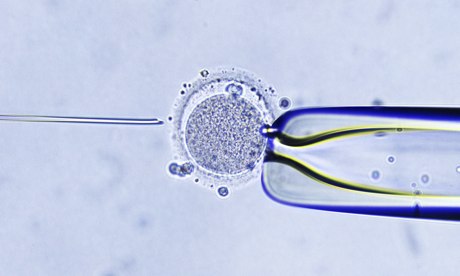
Children born after IVF treatment have a greater risk of complications ranging from preterm birth to neonatal death, according to a major study into the health of newborns.
Doctors found that single IVF babies were nearly twice as likely to be born early, to be stillborn, or to die within the first 28 days of delivery compared with those conceived naturally.
But the study, based on more than 300,000 births in South Australia between 1986 and 1992, did not look at whether IVF treatment was to blame, and leaves open the possibility that the IVF babies fared worse for other reasons, such as health problems, or older age, that caused couples to be infertile in the first place.
"There is in all likelihood a contribution from both the treatment and patient factors," said Michael Davies, who led the study at the University of Adelaide. "We have very unfriendly work practices that mean families defer child-bearing until women are relatively old, and that is tragic."
The age of the medical records, with the most recent being from 2002, means they provide an overview of newborn baby health that is more than a decade old, during which time IVF technology and clinical procedures have advanced.
"We need to add more data to see if the improvements in embryology and clinical treatment over the past five to 10 years have flowed through to improve these perinatal outcomes. That is quite plausible, but we do not know," Davies said.
The researchers found that preterm birth rates rose from 4.7% in naturally conceived babies to 8% in those born to couples who had IVF. Neonatal deaths rose from 0.3% in naturally conceived babies to 0.5% in IVF children.
The findings build on previous work that has found similar rates of birth problems in IVF babies. A survey of medical reviews published in 2004 found that IVF babies had around twice the risk of death shortly before or after birth, and a similarly increased risk of low birthweight and preterm birth.
"What's hard to tease out is how much is due to the treatment itself and how much is due to underlying infertility which the ART [assisted reproductive technology] is overcoming," said Dagan Wells at the Institute of Reproductive Sciences at Oxford University.
Writing in the journal, Plos One, the researchers claim that freezing embryos before thawing and implanting them – an increasingly common procedure – can overcome the risk of preterm birth after ICSI or Intra-Cytoplasmic Sperm Injection, where sperm are injected directly into eggs. Freezing may help because the embryos are implanted once the woman's hormones have settled down after treatment to produce more eggs.
The most striking finding, which needs confirmation, was of a group of women who were diagnosed as infertile but had babies after continuing to try naturally. Babies born to these women appeared to fare much worse than others, with average birthweights that were 250g lighter than others conceived naturally. The risk of these babies being stillborn was nearly seven times greater.
The cause of the problem is unclear and needs confirmation, but if real may be down to the parents' health or lifestyles. But Davies suspects that the women are receiving other treatment that is to blame. "We know this group of women tend to use a drug called clomiphene citrate for infertility. It's a very common, very cheap drug, but its adverse consequences have not been terribly well studied. We are now extremely keen to investigate this," he said.

